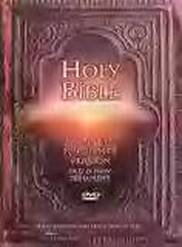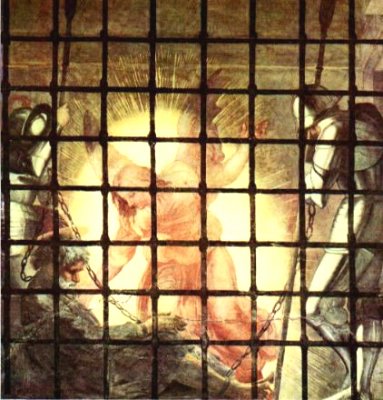Acts Chapter 12:1-17
Lesson 246
Read both the "King James Bible" and the "New Living Translation."
In this lesson:
James is killed, Peter is arrested.
An angel to the rescue.
An angel frees Peter from prison.
Who was -
Herod -
There are several Herods in the Bible. This is Herod Agrippa 1, grandson to Herod the Great, who tried to kill the infant Jesus (Matthew 2:13-16). Herod Agrippa's parents, Bernice and Aristobulus, were cousins. Aristobulus' father, Herod the Great, killed him. Following the family tradition, Herod Agrippa married his cousin, and his sister Herodias married their uncle, Herod Antipas. The same Herod Antipas who beheaded John the Baptist (Mark 6:21-28). Herod Agrippa was raised and educated in Rome, and Bible scholars report that he was charismatic, a gifted speaker, and vain. A good Politician, Herod managed to curry favor with both the Jews and the Romans. We read in this passage that he was a persecutor of Christians. Herod Agrippa murdered the apostle James (Acts 12:2) and imprisoned Peter (Acts 12:4). After governing Galilee, Judea, Samaria, and Perea for seven years, he was killed by an angel (Acts 12:21-23) in AD 44 at the age of fifty-four.
James -
One of the original twelve disciples. James was the son of Zebedee (Matthew 4:21; Mark 1:19) and Salome (Mary's sister), Jesus' cousin, and older brother of the disciple John. Born into a wealthy family, James was a fisherman and partner with Peter (Luke 5:10) when Jesus called and made him part of His inner circle (along with Peter and John). He was allowed to witness the Transfiguration (Matthew 17:1-9; Mark 9:1-13; Luke 9:28-36), the resurrection of Jairus' daughter (Mark 5:37-42; Luke 8:49-55), and Jesus praying in Gethsemane (Matthew 26:37; Mark 14:32-34). Jesus nicknamed James and his brother John the "Sons of Thunder" (Mark 3:17). Jesus predicted that James would meet a bloody end (Matthew 20:23; Mark 10:38-39), and sure enough, James was the first of the twelve apostles to die (excluding Judas).
Mary -
One of seven Mary's mentioned in the New Testament; this is Mark's widowed mother who turned her home into a meeting place for Christians (Acts 12:12). Mary was also the evangelist Barnabas' sister (Colossians 4:10).
John Mark -
He was also called Marcus. Although Mark was not one of the original twelve disciples, he almost certainly knew Jesus personally. Some scholars believe that the young man fleeing Gethsemane naked during Jesus' arrest was Mark (Mark 14:51-52). Mark was a converted Jew, Barnabas' nephew (Colossians 4:10), and the son of Mary, who turned her home into a Christian meeting place (Acts 12:12). He accompanied Paul on his first missionary journey (Acts 12:25; 13:5) but fell out of favor when he left the mission early to return home to Jerusalem (Acts 13:13). Paul's disappointment in Mark created a rift between Barnabas and Paul (Acts 15:36-40). Mark later regained Paul's confidence (2 Timothy 4:11) and stood beside Paul during his first imprisonment in Rome (Philemon 1:23-24). John Mark visited numerous countries witnessing and wrote "The Gospel According to Mark," probably while in Rome when the persecution of Christians was on the rise. He was in Ephesus with Timothy in AD 66 when Paul asked them to join him (2 Timothy 4:11). He also traveled with and was like a son to the apostle Peter (1 Peter 5:13). Many Bible scholars believe Mark was Peter's interpreter and was with him when "The First Epistle General of Peter" was written. It is thought that Mark was a Roman citizen and that he founded the church in Alexandra, where he died during the eighth year of the Roman emperor Nero's reign.
James-
In biblical times James was a common name. There are five James mentioned in the New Testament, including two of Jesus' disciples. This James was Jesus' half-brother (Mark 6:3; Galatians 1:19). He was not one of the original twelve apostles (Matthew 10:2-4) but converted after the crucifixion and became one of the "pillars" in the Jerusalem church (Acts 12:17; 21:18; Galatians 2:9). James eventually succeeded Peter as its leader. He is also the author of one of the earliest books in the New Testament, "The General Epistle of James," written between AD 40-49. He was nicknamed "camel knees" due to the heavy calluses from his frequent praying. Known for his conservative religious views, he was called "James the Just," and had the honor of a private meeting with the resurrected Christ (1 Corinthians 15:7).
As a member of the council at Jerusalem, James sided with Paul to help put an end to the Judaizers debate which threatened to tear the young church apart (Acts 15:13-29; 21:18-24). The historian Flavius Josephus records that the Jewish high priest Ananus ben Ananus had James put to death in AD 62. James was dragged to the top of the Temple in Jerusalem and thrown off. He was severely injured but survived the fall. An angry mob then stoned him until a fuller (launderer) stepped out of the crowd and clubbed him to death with a pole used to beat dirty laundry.
Herod -
There are several Herods in the Bible. This is Herod Agrippa 1, grandson to Herod the Great, who tried to kill the infant Jesus (Matthew 2:13-16). Herod Agrippa's parents, Bernice and Aristobulus, were cousins. Aristobulus' father, Herod the Great, killed him. Following the family tradition, Herod Agrippa married his cousin, and his sister Herodias married their uncle, Herod Antipas. The same Herod Antipas who beheaded John the Baptist (Mark 6:21-28). Herod Agrippa was raised and educated in Rome, and Bible scholars report that he was charismatic, a gifted speaker, and vain. A good Politician, Herod managed to curry favor with both the Jews and the Romans. We read in this passage that he was a persecutor of Christians. Herod Agrippa murdered the apostle James (Acts 12:2) and imprisoned Peter (Acts 12:4). After governing Galilee, Judea, Samaria, and Perea for seven years, he was killed by an angel (Acts 12:21-23) in AD 44 at the age of fifty-four.
James -
One of the original twelve disciples. James was the son of Zebedee (Matthew 4:21; Mark 1:19) and Salome (Mary's sister), Jesus' cousin, and older brother of the disciple John. Born into a wealthy family, James was a fisherman and partner with Peter (Luke 5:10) when Jesus called and made him part of His inner circle (along with Peter and John). He was allowed to witness the Transfiguration (Matthew 17:1-9; Mark 9:1-13; Luke 9:28-36), the resurrection of Jairus' daughter (Mark 5:37-42; Luke 8:49-55), and Jesus praying in Gethsemane (Matthew 26:37; Mark 14:32-34). Jesus nicknamed James and his brother John the "Sons of Thunder" (Mark 3:17). Jesus predicted that James would meet a bloody end (Matthew 20:23; Mark 10:38-39), and sure enough, James was the first of the twelve apostles to die (excluding Judas).
Mary -
One of seven Mary's mentioned in the New Testament; this is Mark's widowed mother who turned her home into a meeting place for Christians (Acts 12:12). Mary was also the evangelist Barnabas' sister (Colossians 4:10).
John Mark -
He was also called Marcus. Although Mark was not one of the original twelve disciples, he almost certainly knew Jesus personally. Some scholars believe that the young man fleeing Gethsemane naked during Jesus' arrest was Mark (Mark 14:51-52). Mark was a converted Jew, Barnabas' nephew (Colossians 4:10), and the son of Mary, who turned her home into a Christian meeting place (Acts 12:12). He accompanied Paul on his first missionary journey (Acts 12:25; 13:5) but fell out of favor when he left the mission early to return home to Jerusalem (Acts 13:13). Paul's disappointment in Mark created a rift between Barnabas and Paul (Acts 15:36-40). Mark later regained Paul's confidence (2 Timothy 4:11) and stood beside Paul during his first imprisonment in Rome (Philemon 1:23-24). John Mark visited numerous countries witnessing and wrote "The Gospel According to Mark," probably while in Rome when the persecution of Christians was on the rise. He was in Ephesus with Timothy in AD 66 when Paul asked them to join him (2 Timothy 4:11). He also traveled with and was like a son to the apostle Peter (1 Peter 5:13). Many Bible scholars believe Mark was Peter's interpreter and was with him when "The First Epistle General of Peter" was written. It is thought that Mark was a Roman citizen and that he founded the church in Alexandra, where he died during the eighth year of the Roman emperor Nero's reign.
James-
In biblical times James was a common name. There are five James mentioned in the New Testament, including two of Jesus' disciples. This James was Jesus' half-brother (Mark 6:3; Galatians 1:19). He was not one of the original twelve apostles (Matthew 10:2-4) but converted after the crucifixion and became one of the "pillars" in the Jerusalem church (Acts 12:17; 21:18; Galatians 2:9). James eventually succeeded Peter as its leader. He is also the author of one of the earliest books in the New Testament, "The General Epistle of James," written between AD 40-49. He was nicknamed "camel knees" due to the heavy calluses from his frequent praying. Known for his conservative religious views, he was called "James the Just," and had the honor of a private meeting with the resurrected Christ (1 Corinthians 15:7).
As a member of the council at Jerusalem, James sided with Paul to help put an end to the Judaizers debate which threatened to tear the young church apart (Acts 15:13-29; 21:18-24). The historian Flavius Josephus records that the Jewish high priest Ananus ben Ananus had James put to death in AD 62. James was dragged to the top of the Temple in Jerusalem and thrown off. He was severely injured but survived the fall. An angry mob then stoned him until a fuller (launderer) stepped out of the crowd and clubbed him to death with a pole used to beat dirty laundry.
Study Tip:
Before starting each study session, ask God to open your heart to His teachings.
Before starting each study session, ask God to open your heart to His teachings.




